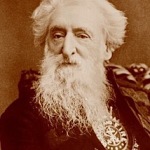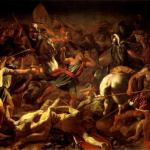William Booth, Inspiring Founder of the Salvation Army (A Guest Post by Kimberley Sullivan)
 |
| William Booth |
 |
| Kimberley Sullivan |
The Secret Spiritual Power of Helplessness: A Lesson from the Life of Gideon
One gain: I am certainly going to listen to the entire Bible this year. Another: I am gripped by the spellbinding sweep of the stories.
I listened to Judges today, captivated by the story of Gideon.
* * *
God sees potential in us which neither we ourselves, nor others see. He calls into existence the things that do not exist. (Romans 4:17). So the angel of the Lord greets the faintly ridiculous, terrified Gideon threshing wheat in a winepress, so as to be unobserved by the Midianites, with words, which sounded ironic, but are, in fact, his new destiny: “The Lord is with you, Mighty Warrior.”
And then Gideon is commissioned to do a task, which humanly speaking, he cannot do. “Go in the strength you have and save Israel out of Midian’s hands. Am I not sending you?”
But Gideon has no strength.
“But Lord” Gideon asked. “How can I save Israel? My clan is the weakest in Manasseh, and I am the weakest in my family.”
Just as we crave for love and significance, God desires our love—and our faith! For us to know him. To believe in him. To believe in who he is. In his goodness and power.
And so he frequently gives us a task too big for us, precisely so that we will have to rely on his power to do it. And then give him the glory, so that his character might be known among the men and women he loves.
And God answers Gideon with an answer most reassuring, if we have faith, “I will be with you.”
Gideon understandably, wonders if he is hallucinating. And so God gives him signs, the famous Gideon’s fleece (Judges 7 36-40.)
* * *
Later, God says something very interesting, “You have too many men for me to deliver Midian into their hands.
In order that Israel may not boast against me that her own strength has saved her,” send back the fearful. The fearful volunteer to go home.
So Gideon’s army is reduced from 32,000 to 10,000.
The next test reduces the army from 10,000 to 300. The Midianites, on the other hand, were “thick as locusts. Their camels could no more be counted than the sand on the seashore.”
And with this vastly reduced army of 300, God is prepared to act.
* * *
Sometimes, we experience God’s provision most vividly when we are desperate. I received business ideas and guidance after I tried and failed to create a viable business with my own strength.
It exhausted me, so I had to cry out to the Lord in my distress for a sustainable idea which He gave.
We are so self-sufficient that we need to reach the point of desperation—of being confronted with tasks too great for us before we turn to God.
I am seeking God about this blog because my stats have been dropping. I don’t want to spend more than an hour a day on it. But I feel tempted to spend more time on my blog when my stats drop.
At the prophetic conference I went to recently, Patricia Bootsma pointed out that roots are invisible, but for a tree to be visible, and tower over the rest, it needs a deep, massive root structure for strength, stability and nourishment. Our roots lie in the secret hours we spend with God.
For a Christian blogger, the secret to growing an audience may not lie in working more, working harder, or even working smarter (though the latter helps).
It may well lie in hearing the voice and words of God, overhearing his whispers, knowing his heartbeat, so that what you write are words of life, comfort, encouragement, wisdom and strength. Shrewd marketing cannot give you this, or social media savvy, or hard work; it comes from hanging out with God.
* * *
So Gideon sends back 9700 men, asking them to leave behind their trumpets. Normally, there are just a few trumpeters in an army, but now each of the 300 men has a trumpet, giving the impression of a far larger army.
And God delivers them in one of his trademark ways: An idea so good, so unusual, so startling, so clever that men wouldn’t have thought of it themselves.
Gideon tells his three hundred men, “Get up. The Lord has given the Midianite camp into your hands.” Talk about positive, faith-filled thinking!!
So Gideon divides his men into three groups of a hundred, with torches in empty jars and trumpets. At a signal, they were to smash their jars, flash their torches, blow their trumpets and shout, “A sword for the Lord, and for Gideon.”
And because of the proliferation of trumpets, the racket of the broken jars, and the sudden shock of the torches and war cries in the darkness, they created the impression of a massive army.
Groggy and terrified by this middle of the night awakening, the darkness, trumpets and battle cries, the Midianites fled. And Gideon won, delivering his people through an outrageous, God-given strategy.
* * *
The story reminds me not to rely on my natural gifts, such as they are, or on free time or hard work to achieve my goals, but to continue asking God for his strategy, his ideas, and his blessing.
And to never forget that one of God’s blessings are good ideas and good strategy, which he gives to those who ask him.
Work, Exercise, God: Panaceas, One better than the Others
Annoyingly, I can’t find it online, but as a teenager, my father had given me a quote from Charles Kingsley saying something like, “If you are sad, work. If you are sleepless, work. If you are bored, work. If you are restless, work. If disappointed, work. If heartbroken, work.”
“Prophetic Decrees”
Augustine of Hippo: He being dead, yet speaketh. A Guest Post by Joshua Lake
He looks to You for friendship.
He makes enemies only to protect Your honor.
The one fixed in You sees his earthly loves as beloved in You.
You alone cannot be lost; You only are certain.
Our God are You who made heaven and earth.
You fill them with works of Your creation.
– Confessions, page 59 (Modern English Version, Baker Book House: 2005).
A Dream-Crusher or Dream-Nurturer?
Roy’s Favourite Spurgeon Quote
- « Previous Page
- 1
- …
- 19
- 20
- 21
- 22
- 23
- …
- 121
- Next Page »




.jpg!Blog.jpg)




